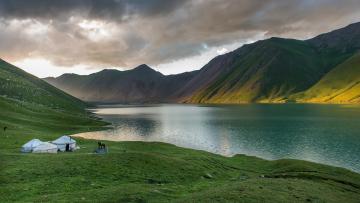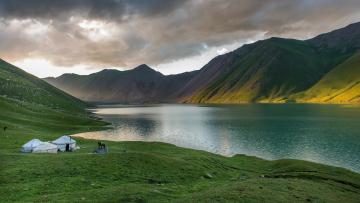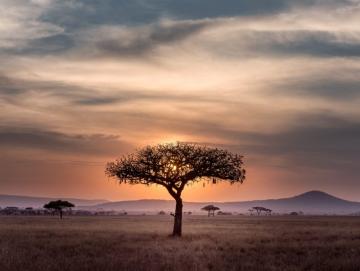
The Economics for Nature (E4N) initiative and GGKP’s Expert Group on Natural Capital continue to champion the mainstreaming of natural capital approaches to green growth, and the implementation of new natural capital tools, indicators and decision-making methods in national green growth planning.
In 2020, the initiative achieved several major milestones, including: significant mainstreaming of natural capital in leading institutions; publication of five new working papers; pilot testing of natural capital approaches in India, Kyrgyzstan, Myanmar and Rwanda; and supported the E4N initiative in organizing a global discussion on natural capital and green growth known as the Africa Green Economy Forum.
Mainstreaming natural capital in leading institutions
Since the GGKP Expert Group on Natural Capital was launched in 2017, the group has been working to advance the state of knowledge on natural capital valuation for green growth, mainstream natural capital in green growth activities and support stronger implementation of policies for natural capital (read about the group’s main activities and achievements in 2018 and 2019).
 The group’s ongoing efforts have borne fruit in 2020. In November, the OECD Green Growth and Sustainable Development Forum focused entirely on natural capital resilience, risk and COVID-19. The GGKP Expert Group co-organized a session on measuring natural capital and biodiversity, sharing results from a new series of working papers, raising key policy questions, spotlighting remaining knowledge gaps and thinking through the kind of efforts that should be made to address them.
The group’s ongoing efforts have borne fruit in 2020. In November, the OECD Green Growth and Sustainable Development Forum focused entirely on natural capital resilience, risk and COVID-19. The GGKP Expert Group co-organized a session on measuring natural capital and biodiversity, sharing results from a new series of working papers, raising key policy questions, spotlighting remaining knowledge gaps and thinking through the kind of efforts that should be made to address them.
Also in 2020, the Global Green Growth Institute (GGGI) – with support of the GGKP Expert Group and another E4N initiative team – released the 3Returns Framework, which now uses the capitals approach. The framework was tested in three townships in coastal Myanmar in the context of mangrove restoration projects, with results showing that the integration of natural, social and human capital produced a higher return of investment. The pilot testing in Myanmar is now being scaled up using the 3Returns Framework in mangrove areas across the entire coastal region of Myanmar, with support from the World Bank through the Myanmar Reforestation and Rehabilitation Programme (2017-2026).
With these positive outcomes, it is expected that the capitals approach could guide the integration of nature’s value in green growth operations in leading institutions like the OECD and GGGI in the coming years.
Learn more:
Advancing the state of knowledge on natural capital
 In response to the growing recognition of the importance of natural capital – soil, water, air and all living things – under the umbrella of the E4N initiative, the GGKP Expert Group on Natural Capital released five reports to advance the state of knowledge on natural capital for green growth. These reports advance our capacity to integrate natural capital in national decision-making processes as a critical lever to achieve the UN Sustainable Development Goals (SDGs) by 2030:
In response to the growing recognition of the importance of natural capital – soil, water, air and all living things – under the umbrella of the E4N initiative, the GGKP Expert Group on Natural Capital released five reports to advance the state of knowledge on natural capital for green growth. These reports advance our capacity to integrate natural capital in national decision-making processes as a critical lever to achieve the UN Sustainable Development Goals (SDGs) by 2030:
- Practical Policy Use Cases for Natural Capital Information, which provides a snapshot of the current status of public knowledge and documentation, outlining how different types of natural capital information are used to inform and influence government decisions. This was presented as an issue paper at the 2020 OECD Green Growth and Sustainable Development Forum (GGSD).
- Natural Capital Platforms and Tools for Green Growth Planning, which assesses 28 platforms and tools based on their potential to provide access, manipulate and visualize natural capital data.
- Measuring Nature’s Contribution to Economic Development presents an integrated Natural Capital Indicator Framework, providing a structure for countries to select and organize indicators to assess their use of and dependence on natural capital.
- The Natural Capital and the Sustainable Development Goals report, which goes into detail on how to estimate the “natural capital gap” – the difference between the level of such capital now and the amount that will be needed to meet the SDGs.
- Recognizing Natural Capital in Policy Frameworks for Green Growth, which reviews 11 green growth and natural capital policy frameworks to derive a set of “checklist” criteria for integrating natural capital into green growth policy advice. This integration framework is then applied to the green growth policy frameworks of four leading organizations – Global Green Growth Institute (GGGI), Organisation for Economic Co-operation and Development (OECD), United Nations Environment Programme (UNEP) and World Bank.
“These reports explore state-of-the-art methods, models, data and tools for mainstreaming natural capital in national green growth policies and practices,” said Paul Ekins, Director of the UCL Institute for Sustainable Resources at University College London and Co-chair of the GGKP Expert Group. “Our expert group leverages global momentum for green growth in order to better value, protect and enhance natural capital in national economic decision-making.”
Learn more:
- Measuring nature’s contribution: The latest from the GGKP Expert Group
- Natural Capital Research Project: An integrated approach to work on data, metrics and policy for green growth planning
Testing new natural capital methodologies on the ground
 Moving beyond knowledge generation, the GGKP Expert Group undertook significant knowledge application activities on the ground. The group’s new methodology for estimating the “natural capital gap” – the difference between the level of such capital now and the amount that will be needed to meet the SDGs – was applied in three countries: India, Kyrgyzstan and Rwanda. The pilot testing focused on terrestrial natural capital, and was implemented in collaboration with in-country partners and the Economics of Land Degradation (ELD) initiative hosted by the Deutsche Gesellschaft für Internationale Zusammenarbeit (GIZ).
Moving beyond knowledge generation, the GGKP Expert Group undertook significant knowledge application activities on the ground. The group’s new methodology for estimating the “natural capital gap” – the difference between the level of such capital now and the amount that will be needed to meet the SDGs – was applied in three countries: India, Kyrgyzstan and Rwanda. The pilot testing focused on terrestrial natural capital, and was implemented in collaboration with in-country partners and the Economics of Land Degradation (ELD) initiative hosted by the Deutsche Gesellschaft für Internationale Zusammenarbeit (GIZ).
Results and lessons learned from the in-country teams – including how a natural capital approach can add value on top of a traditional cost benefit analysis – were shared with national stakeholders in Kyrgyzstan and Rwanda through virtual meetings, and to a global audience through the #GGKPwebinar SDGs Erosion: How terrestrial natural capital will save the 2030 Agenda.
On-the-ground activities in 2020 built on in-country applications conducted in Indonesia and Myanmar in 2018. Collectively, this work demonstrated the importance of testing methodologies on the ground for review, refinement and policy relevance. Testing of terrestrial natural capital approaches will continue with ELD’s growing knowledge network for land and soil restoration. In 2021, GGKP will also begin testing the approach in an entirely new biome: marine and coastal ecosystems. The E4N initiative and the GGKP Expert Group look forward to demonstrating how marine natural capital approaches can contribute to a transition to a sustainable blue economy.
A global discussion on natural capital in the era of COVID-19 and beyond
In 2020, the GGKP brought together 17 experts and almost 1,000 participants for a series of discussions on how governments and businesses can better value natural and social capital for informed decision-making.
 In the June 2020 webinar Valuing nature in the post-pandemic world – part of the GGKP’s Sustainability After COVID-19 series – biodiversity experts joined representatives from the private sector and civil society for a discussion on the relationship between nature and zoonotic diseases, including COVID-19, and how investment in biodiversity and natural capital can support long-term economic recovery.
In the June 2020 webinar Valuing nature in the post-pandemic world – part of the GGKP’s Sustainability After COVID-19 series – biodiversity experts joined representatives from the private sector and civil society for a discussion on the relationship between nature and zoonotic diseases, including COVID-19, and how investment in biodiversity and natural capital can support long-term economic recovery.
“We’re not going to solve our current problems using the same type of short-term thinking that got us here: we need to think longer term, with a systems approach,” said Director-General of the MAVA Foundation Lynda Mansson during the broadcast. “Rewiring our economies and businesses with a better, and more complete, understanding of our relationship to nature is key to building resilient green economies that are fit for the future.”
Building on this, the webinar Measuring Nature’s Contribution: How natural capital will transform the economic recovery explored the latest methods for assessing natural capital in national policies aimed at achieving sustainable development in the post-COVID recovery. It featured an OECD keynote address on green growth and delved into the findings of the latest knowledge from the GGKP Expert Group on Natural Capital.
The discussion will continue in 2021, focusing on the E4N initiative on mainstreaming natural capital in development finance in Africa, as well as on assessing financial gaps to achieve nature-related SDG targets for countries with rich terrestrial and marine natural assets.
The African Forum on Green Economy
 In collaboration with E4N partners and the African Development Bank (AfDB), the GGKP Expert Group on Natural Capital co-organized the African Forum on Green Economy – a three-month online exchange that brought together leading experts to explore how African countries are pioneering the transition to greener, fairer economies.
In collaboration with E4N partners and the African Development Bank (AfDB), the GGKP Expert Group on Natural Capital co-organized the African Forum on Green Economy – a three-month online exchange that brought together leading experts to explore how African countries are pioneering the transition to greener, fairer economies.
The forum featured dedicated sessions on such themes as integrating the value of water into business operations and decisions, inclusive and sustainable approaches to agriculture, data for natural capital decision-making and enabling change in the African context.
The GGKP Expert Group organized two sessions on natural capital in development finance and infrastructure. These sessions featured among others the senior director of the African Development Institute, the senior adviser for Africa at the World Bank, the Africa regional director of the World Wide Fund for Nature, and the finance and Information, Communications and Technology (ICT) director at KenGen and director at the African Institute for Development Policy in Kenya.
The African Forum also served as the launch pad for the Natural Capital Accounting Community of Practice for Africa – an essential step towards unifying governments, institutions and other key African stakeholders around a shared ambition to accelerate the uptake of the natural capital approach in the regions where it matters most.
Mainstreaming natural capital in Africa after COVID-19

COVID-19 has fundamentally changed the way people live, work and do business. The GGKP and E4N partners have adapted to the “new normal,” focusing their effort on “building back better,” particularly in Africa.
The year 2020 marked a major milestone in the GGKP’s efforts to seek applied solutions to the gaps identified by the Natural Capital Expert Group. The GGKP has joined forces with the AfDB on a program to mainstream natural capital in African development finance after COVID-19. The program will lay the foundation for natural capital-based green economies in Africa by mainstreaming natural capital in AfDB’s development finance operations and its support to African member countries.
The GGKP and E4N partners have mobilized key partners in this effort, such as GIZ, the International Institute for Sustainable Development (IISD), MAVA Foundation and the World Wide Fund for Nature (WWF). A core goal of the program will be to demonstrate the value of the capitals approach in AfDB’s lending operations in Africa. The first demonstration of this value is already underway in partnership with IISD, applying the Sustainable Asset Valuation (SAVi) tool and data derived from the EU’s Copernicus Earth Observation Programme to assess the natural capital impacts and dependencies of an infrastructure project in Tanzania. The final report will be released in the first half of 2021. The project will come before the AfDB Board for a final decision in mid-2021.
***
About the GGKP Natural Capital Expert Group
The GGKP Expert Group on Natural Capital explores state-of-the-art methods, models, data and tools to achieve its three goals of pushing forward the knowledge frontier around natural capital and green growth, mainstreaming natural capital in global green growth activities, and supporting stronger implementation of natural capital commitments in national economic plans. The group is comprised of 26 experts from across GGKP’s partner institutions, each with at least 10 years of experience working with natural capital. For more information, see About the Natural Capital Expert Group.
Economics for Nature
The GGKP Expert Group on Natural Capital was established in the context of the Economics for Nature (E4N) programme, a six-year initiative focused on ensuring that nature has a voice in economic and planning processes. The GGKP is part of the core team alongside the Green Economy Coalition, the Capitals Coalition and WWF-France.
MAVA Foundation
The MAVA Foundation, a Swiss-based philanthropic organization, has made the mainstreaming of natural capital into national development plans a key focus of its strategic programme for 2017-2022. It has committed to supporting the working group for five years.
